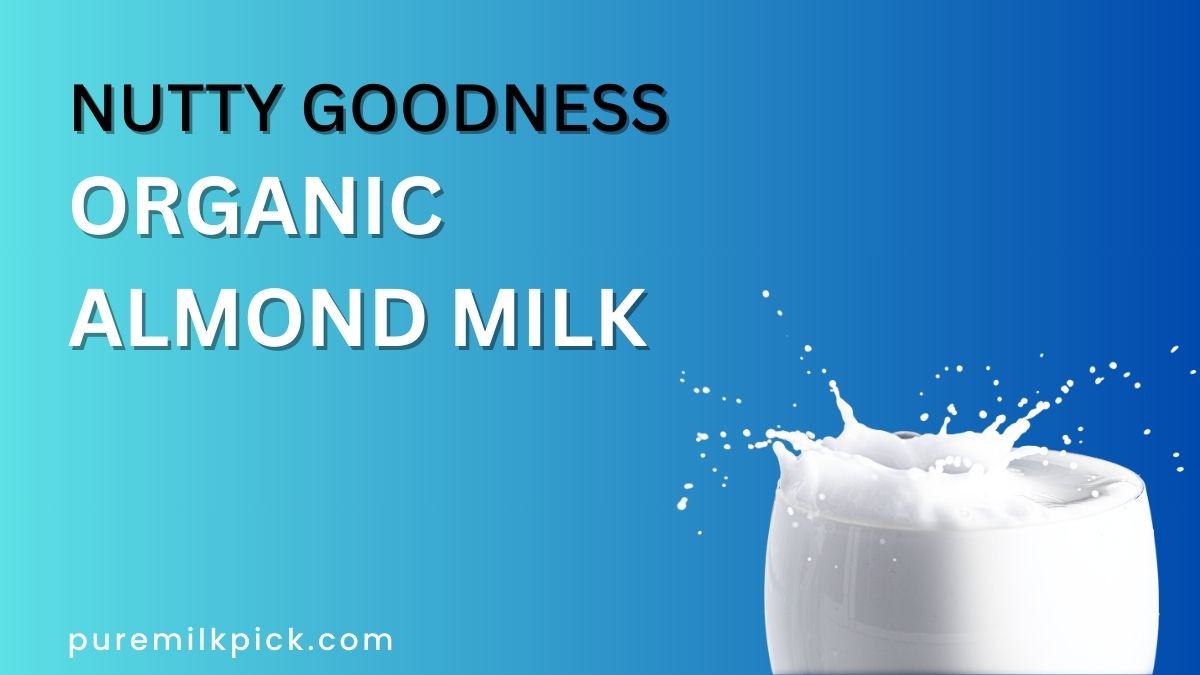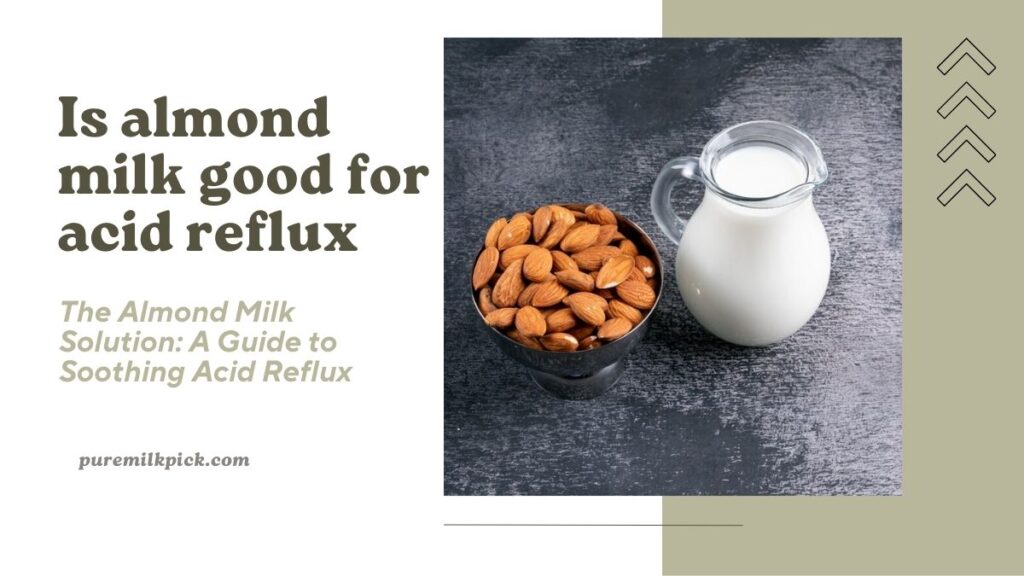In recent years, there’s been a growing buzz around almond milk, especially the organic variety. People increasingly opt for this plant-based milk as a nutritious and sustainable alternative to traditional dairy. If you’ve ever been curious about what makes organic almond milk so special, you’ve come to the right place.
In this comprehensive guide, we will delve into the delightful world of organic almond milk. We’ll explore its nutritional value, benefits, and how you can incorporate it into your daily routine. Whether you’re a vegan, lactose intolerant, or simply looking to make more eco-conscious choices, this blog post has something for everyone.
What is Organic Almond Milk?
Understanding Organic Certification
Before we dive into the benefits of organic almond milk, let’s clarify what “organic” actually means. Organic certification ensures that the almonds used to make your milk are grown without synthetic pesticides, herbicides, or genetically modified organisms (GMOs). Farmers rely on natural methods to nurture almond trees, which not only benefit the environment but also contribute to the overall health of the almond crop.
Transitioning to organic almond farming reduces chemical runoff into soil and waterways, making it a win-win for both our health and the planet’s wellbeing.
Benefits of Choosing Organic Almond Milk
When you choose organic almond milk, you’re not just making a health-conscious decision; you’re also supporting sustainable agriculture. Organic farming practices prioritize soil health, biodiversity, and conservation of resources. These practices lead to almonds that are not only free from harmful chemicals but also packed with more nutrients.

One of the primary benefits of organic almond milk is its purity. Without synthetic pesticides and GMOs, you can enjoy a clean beverage that’s clean and devoid of potentially harmful residues. This makes it an excellent choice for individuals with allergies or sensitivities to chemicals commonly used in conventional farming.
Organic almond milk is also a boon for the environment. By supporting organic farming, you help reduce the pollution of soil and water. Additionally, organic farms often use innovative methods such as cover cropping and crop rotation to maintain soil health, which is essential for long-term sustainability.
Environmental Considerations
The environmental aspect of organic almond milk goes beyond just farming practices. It’s about making choices that reduce your carbon footprint. By supporting organic, you encourage practices that prioritize soil health, reduce water usage, and promote biodiversity—all crucial elements in the fight against climate change.
For those concerned about the environmental impact of almond farming, it’s important to note that almonds, in general, require less water compared to other nuts and dairy farming. However, sustainable practices, like those employed in organic farming, further minimize this water footprint.
Nutritional Value of Organic Almond Milk
Comparison with Regular Almond Milk
You might be wondering if there’s a significant difference between organic and regular almond milk when it comes to nutrition. While both types offer various health benefits, organic almond milk has a few advantages worth noting.
Organic almond milk is typically made from almonds grown without synthetic pesticides or herbicides. This means you’re less likely to consume residues from these chemicals, which can be found in conventional almond milk. Additionally, organic almonds may have a slightly higher nutrient content due to the healthier soil in which they’re grown.
Key Nutrients and Health Benefits
Now, let’s explore the essential nutrients found in a glass of organic almond milk. One of its primary nutritional benefits is its low-calorie content, making it an excellent choice for those watching their weight. A typical 8-ounce serving contains around 30-40 calories, which is significantly less than cow’s milk.
One of the standout nutrients in almond milk is vitamin E, an antioxidant known for its role in skin health and immune function. Almond milk is also fortified with vitamins like vitamin D and calcium, making it a good source of these bone-boosting nutrients, particularly for individuals on dairy-free diets.
Sustainable Almond Farming Practices
Sustainable Almond Farming Practices
When it comes to sustainability, not all almond farms are created equal. Conventional almond farming has faced scrutiny for its water-intensive nature, but organic almond farming has taken steps to address these concerns.

Organic almond farms often implement practices like drip irrigation, which significantly reduces water wastage compared to traditional flood irrigation. Moreover, they prioritize soil health through techniques such as cover cropping, crop rotation, and reduced tillage. These practices not only conserve water but also help sequester carbon in the soil.
Ethical Sourcing of Organic Almonds
Choosing organic almond milk is not just about what’s in the product; it’s also about how the almonds are sourced. Ethical considerations play a significant role in organic almond production.
Many organic almond producers work directly with local farmers, ensuring fair compensation and safe working conditions. By supporting these brands, you contribute to a supply chain that values the livelihoods of almond farmers, fostering ethical practices in the industry.
Reducing Environmental Impact
The environmental impact of almond farming has been a topic of discussion in recent years. Almonds do require a significant amount of water to grow, leading to concerns about water scarcity in regions where almond farming is prevalent.
However, it’s essential to note that almond milk production typically consumes less water than cow’s milk production. Moreover, some almond farms are adopting innovative water-saving techniques like micro-sprinkler irrigation, which can significantly reduce their water usage.
Sourcing Organic Almond Milk
Finding Organic Almond Milk in Stores
If making almond milk at home isn’t your preference, you can easily find organic almond milk in grocery stores and supermarkets. Many reputable brands offer organic varieties that meet high-quality standards.
When shopping for organic almond milk in stores, look for certifications such as USDA Organic or the European Union’s organic label. These certifications indicate that the product meets strict organic farming and processing standards.
Online Retailers and Delivery Options
The convenience of online shopping has made it easier than ever to access organic almond milk. Numerous online retailers specialize in organic and health-conscious products, including almond milk.
You can order organic almond milk through popular online marketplaces or directly from the websites of organic brands. Opting for home delivery reduces your carbon footprint by avoiding the need to travel to physical stores.
Supporting Local Producers
Another excellent way to source organic almond milk is by supporting local producers and farmers’ markets. Many small-scale, organic almond milk producers sell their products directly to consumers through local markets or online platforms.
By choosing to buy from local producers, you not only access fresh, organic almond milk but also contribute to the sustainability of your community. Additionally, you may discover unique flavors and variations that you won’t find in larger retail stores.
Organic Almond Milk in Everyday Cooking
Usage in Recipes: Smoothies, Coffee, and More
Organic almond milk’s versatility extends beyond a simple glass of milk. It can be seamlessly integrated into various recipes, enhancing both flavor and nutritional value.

One popular use for almond milk is in smoothies. Its creamy texture and slightly nutty taste pair perfectly with fruits, vegetables, and protein powders. You can also use almond milk as a base for your morning cereal, oatmeal, or chia pudding for a dairy-free and nutritious start to the day.
Substituting for Dairy Milk in Cooking and Baking
Organic almond milk is a fantastic substitute for dairy milk in cooking and baking. Whether you’re making creamy pasta sauces, soups, or baked goods like muffins and pancakes, almond milk can replace dairy milk one-to-one in most recipes.
When using almond milk in savory dishes, opt for the unsweetened variety to avoid adding unwanted sweetness to your meals. In baking, you can use sweetened almond milk if the recipe calls for a touch of sweetness.
Creative Culinary Uses
If you’re feeling adventurous, explore creative culinary uses for organic almond milk. It’s a fantastic addition to homemade ice cream, lending a subtle nutty flavor. You can also use almond milk to make dairy-free cheese sauces, salad dressings, and even dairy-free yogurt.
For those who enjoy experimenting in the kitchen, almond milk opens the door to a world of possibilities. Its mild, nutty flavor can enhance both sweet and savory dishes, making it a versatile ingredient for any culinary enthusiast.
Addressing Common Concerns about Almond Milk
Allergies and Sensitivities
One common concern about almond milk is allergies. While almond allergies are relatively rare compared to other allergens like peanuts, they do exist. If you or someone in your household has a nut allergy, almond milk may not be a suitable option.
However, there are various other plant-based milk alternatives available, such as soy milk, oat milk, or rice milk, which can be excellent choices for those with nut allergies or sensitivities.
Taste and Texture Compared to Dairy Milk
The taste and texture of organic almond milk are not identical to dairy milk, and some people may find it takes a little getting used to. Almond milk has a slightly nutty and sometimes slightly sweet flavor that sets it apart from dairy milk’s neutral taste.
The texture is typically creamy but can vary between brands and homemade versions. If you find the texture too thin for your liking, you can try different brands or adjust the water-to-almond ratio when making your own.
Shelf Life and Storage Tips
Like all perishable products, organic almond milk has a limited shelf life. When purchased from a store, it usually comes with a “best by” date. Once opened, it’s advisable to consume it within 7-10 days, although this can vary depending on the brand and preservatives used.
To extend the shelf life, store your almond milk in the refrigerator at or below 40°F (4°C). Keep it tightly sealed to prevent any off-flavors from being absorbed from the fridge.
Conclusion
In this comprehensive guide, we’ve explored the world of organic almond milk from its roots in sustainable farming practices to its diverse culinary applications. Organic almond milk stands out as a nutritious, eco-conscious choice that supports both personal health and the health of our planet.
By understanding the benefits of organic certification, the nutritional value of almond milk, and how to make it at home, you’ve gained valuable insights into this dairy alternative. Whether you choose to enjoy it in your morning coffee, your favorite smoothie, or your family’s cherished recipes, organic almond milk offers a delightful and sustainable way to nourish your body.
Incorporating organic almond milk into your lifestyle is not only a wise dietary decision but also a small yet meaningful step toward a more sustainable and ethical way of living. So, go ahead, pour yourself a glass of nutty goodness, and savor the creamy richness of organic almond milk.
FAQs (Frequently Asked Questions)
Yes, organic almond milk is generally better for the environment. Organic farming practices prioritize soil health, reduce water usage, and promote biodiversity, making them more sustainable in the long run.
Absolutely! Almond milk is a versatile dairy milk substitute in both cooking and baking. It works well in a wide range of recipes, from creamy soups to decadent desserts.
Almond milk is a nut-based product, so individuals with nut allergies should avoid it. Additionally, some commercial almond milk may contain additives or sweeteners, so it’s essential to read labels carefully if you have specific dietary concerns or preferences.




One Comment